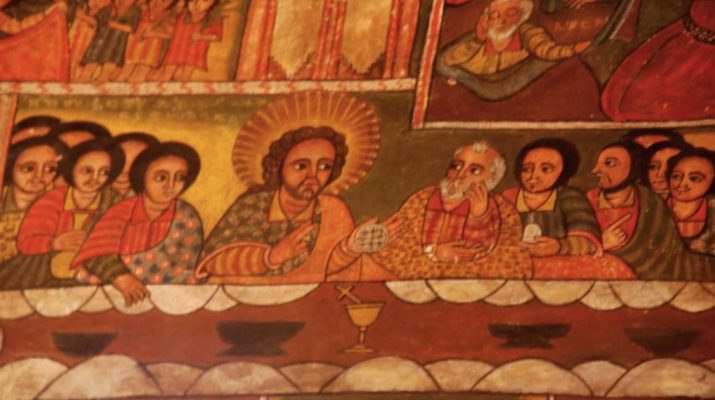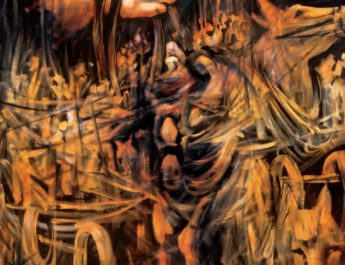John 13:21-32
Wednesday of Holy Week ABC
21 After saying this JesusA was troubledB in spiritC and declared,D
A “Jesus” = Iesous. From Hebrew Yehoshua (Joshua, the Lord is salvation); {from YHVH (proper name of the God of Israel; the self-existent and eternal one); {from havah (to become) or from hayah (to come to pass, become, be)} + yasha (to deliver, defend, help, preserve, rescue; properly, to be open, wide or free, which implies being safe. So, in a causative sense, this is to free someone)}. This is Jesus or Joshua in Greek – the Lord saves or the Lord is salvation.
B “was troubled” = tarasso. 18x in NT. This is trouble, agitate, stir up. It is motion back and forth, creating inner turmoil or confusion, roiling water.
C “spirit” = pneuma. From pneo (to blow, breathe, breathe hard). This is wind, breath, or ghost. A breeze or a blast or air, a breath. Figuratively used for a spirit, the human soul or part of us that is rational. It is also used supernaturally for angels, demons, God, and the Holy Spirit. This is where pneumonia comes from.
D “declared” = martureo. From martus (a witness whether having heard or seen something; witness literally, judicially, or figuratively; by analogy, a martyr). This is to bear witness, testify, give evidence. It is to testify in a literal or figurative sense.
“Very truly,E I tellF you, oneG of you will betrayH me.”
E “very truly” = amen + amen. From Hebrew amen (verily, truly, amen, truth, so be it, faithfulness); from aman (to believe, endure, fulfill, confirm, support, be faithful, put one’s trust in, be steadfast. Figuratively, this is to be firm, steadfast, or faithful, trusting, believing, being permanent, morally solid). This word is literally firmness, but figuratively fidelity, faithfulness, honesty, responsibility, trust, truth, steadfastness. Properly, it is to be sure, certain, or firm. This is a word of emphasis indicating that something crucial follows.
F “tell” = lego. This is to speak, say, name, call, command. It is generally to convey verbally.
G “one” = heis. This is one, a person, only, some.
H “betray” = paradidomi. From para (from beside, by) + didomi (give, offer, place, bestow, deliver; give in a literal or figurative sense). This is literally to hand over – hence to deliver, abandon, or betray. It implies a personal involvement.
22 The disciplesI lookedJ at one another, uncertainK of whom he was speaking.L
I “disciples” = mathetes. From matheteuo (to make a disciple of); from manthano (to learn key facts, gain knowledge from experience; generally implies reflection as part of the learning process); from math– (thinking things through). This is a disciple, learner, or student. It is where we get “mathematics” from.
J “looked” = blepo. This is literally to see – it is primarily used in the physical sense. However, figuratively it can be seeing, which includes attention and so to watchfulness, being observant, perceiving, and acting on the visual information. It can also mean beware.
K “uncertain” = aporeo. 6x in NT. From a (not) + poros (way, resource, passageway); {related to poreuomai (to go, travel, journey, or die; transporting things from one place to another and focuses on the personal significance of the destination)}. This is feeling like you have no way out, being perplexed or doubting.
L “speaking” = lego. Same as “tell” in v21. See note F above.
23 One of his disciples—the one whom Jesus lovedM—was recliningN close to his heart;O
M “loved” = agapao. Perhaps from agan (much). This is love, longing for, taking pleasure in. It is divine love or human love that echoes divine love.
N “reclining” = anakeimai. 14x in NT. From ana (up, again, back, among, between, anew) + keimai (to lie, recline, be set, appointed, destined; to lie down literally or figuratively). This is to recline, particularly as one does for dinner. It can also be reclining as a corpse.
O “close to his heart” = en + ho + kolpos. Literally, “on his bosom.” Kolpos is 6x in NT. It is bosom (as in the bosom of Abraham from Like 16:22-23). It is also chest, where their garments would fold over. Reclining in this position connoted intimacy and union.
24 SimonP PeterQ therefore motionedR to him to askS Jesus of whom he was speaking.
P “Simon” = Simon. From Hebrew Shimon (Simon – Jacob’s son and his tribe); from shama (to hear, often implying attention and obedience). This is Simon, meaning “he who hears.”
Q “Peter” = Petros. Related to petra (large rock that is connected and or projecting like a rock, ledge, or cliff; can also be cave or stony ground). This is Peter, a stone, pebble, or boulder.
R “motioned” = neuo. 2x in NT. This is to motion towards someone, to nod or make a gesture.
S “ask” = punthanomai. 12x in NT. This is to ask in order to learn. It is not to ask a favor (erotao in Greek), to demand something felt to be owed (aiteo), to search for a hidden thing (zeteo), or to ask for urgent help (deomai). This is to figure something out through questions.
25 So while recliningT next toU Jesus, he askedV him, “Lord,W who is it?”
T “reclining” = anapipto. 12x in NT. From ana (up, again, back, among, anew) + pipto (to fall literally or figuratively). This is to fall back, recline, lie down. One reclined at the dinner table.
U “next to” = epi + ho + stethos. Literally, “on his chest.” Stethos is 5x in NT. Perhaps from histemi (to stand, place, set up, establish, stand firm). This is the breast or chest.
V “asked” = lego. Same as “tell” in v21. See note F above.
W “Lord” = Kurios. From kuros (authority, supremacy). This is a respectful address meaning master or sir. It refers to one who has control or power greater than one’s own. So, it was also applied to God and Jesus as Master or Lord.
26 Jesus answered, “It is the one to whom I giveX this piece of breadY when I have dippedZ it in the dish.”
X “give” = didomi. Related to “betray” in v21. See note H above.
Y “piece of bread” = psomion. 4x in NT. From psomos (fragment, morsel) or from psocho (to rub as rubbing kernels from their husks or rub to pieces); from psallo (to twang, play, sing psalms, pluck a stringed instrument such as a harp); {from psao (to rub). This is a crumb, morsel, or mouthful.
Z “dipped” = bapto. 4x in NT. This is to dip, dye, or submerge in liquid. It is the root of the word “baptism.”
So when he had dipped the piece of bread, heAA gave it to JudasBB son of Simon Iscariot.CC
AA {untranslated} = lambano. It does not refer to passive receiving of something, but active acceptance or taking of something whether it is offered or simply nearby. It focuses on individual decision and action.
BB “Judas” = Ioudas. From Hebrew Yehudah (Judah, son of Jacob, his tribal descendants, a name for the southern kingdom. Literally, it means praised); probably from yadah (to throw one’s hands into the air in a gesture of praise); from yad (hand). This is Judah or Judas, meaning praised.
CC “Iscariot” = Iskariotes. 11x in NT. From Hebrew probably ish (man, husband); {perhaps from enosh (human, humankind, mortal); from anash (to be frail, feeble)} + qirya (city); {Aramaic corresponding to qiryah (city, building); from qarah (to happen, meet, bring about)}. Iscariot means person from Kerioth.
27 After he received the piece of bread, SatanDD enteredEE into him. Jesus saidFF to him, “DoGG quicklyHH what you are going to do.”
DD “Satan” = Satanas. From Hebrew satan (adversary, Satan); from satan (to be an adversary, attack, accuse, resist). This is Satan, the adversary, or an adversary.
EE “entered” = eiserchomai. From eis (to, into, for, among) + erchomai (to come, go). This is to go in in a literal or figurative sense.
FF “said” = lego. Same as “tell” in v21. See note F above.
GG “do” = poieo. This is to make, do, act, construct, abide, or cause.
HH “quickly” = tachion. 4x in NT. From tachus (quickly, promptly; without unreasonable delay). This is more rapidly, more swiftly, without unnecessary delay.
28 Now no oneII knewJJ why he said this to him. 29 Some thoughtKK that, because Judas hadLL the common purse,MM
II {untranslated} = anakeimai. Literally, “of those reclining.” Same as “reclining” in v23. See note N above.
JJ “knew” = ginosko. This is to know, recognize, realize, perceive, learn. It is knowledge gained through personal experience.
KK “thought” = dokeo. From dokos (opinion). This is to have an opinion, seem, appear, think, suppose. It deals with a personal judgment. This is the root of the word “doxology.”
LL “had” = echo. This is have, hold, possess.
MM “common purse” = glossokomon. 2x in NT. From glossa (tongue, language – a nation identified by the language they share; speaking) + the same as komizo (to carry, convey, recover); {from komeo (to take care of)}. This is bag, purse, chest. It could refer to a case for mouthpieces, a casket, or a money bag.
Jesus was telling him, “BuyNN what we needOO for the festival,”PP or that he should give something to the poor.QQ
NN “buy” = agorazo. From agora (assembly, forum, marketplace, town square, thoroughfare); from ageiro (to gather). This is to go and buy something at market with a focus on goods being transferred. It can also mean to purchase or redeem.
OO “need” = chreia + echo. Chreia is from chraomai (to use, make use of, give what is needed, act in a specific way, request); related to chre (what is proper, fitting, or necessary). This is the is task, business, or affair. It can also be need, want, or destitution. Echo is the same as “had” in v29. See note LL above.
PP “festival” = heorte. This is a holiday or feast.
QQ “poor” = ptochos. From ptosso (to crouch or cower as a beggar does). This is poor or destitute – someone who is extremely poor and bowed down because of a long struggle under poverty. Properly, it means bent over so figuratively it is someone who is deeply destitute and lacking tangible resources. This is a beggar – as extremely opposite a wealthy person as possible.
30 So, after receivingRR the piece of bread, he immediatelySS went out.TT And it was night.
RR “receiving” = lambano. Same as {untranslated} in v26. See note AA above.
SS “immediately” = eutheos. From euthus (immediately, upright, straight and not crooked); {perhaps from eu (good, well, well done, rightly) + tithemi (to place, lay, set, establish)}. This is directly, soon, at once.
TT “went out” = exerchomai. Related to “entered” in v27. From ek (from, from out of) + erchomai (see note EE above). This is to go out, depart, escape, proceed from, spread news abroad.
31 When he had gone out, Jesus said, “Now the SonUU of ManVV has been glorified,WW and GodXX has been glorified in him. 32 If God has been glorified in him, God will also glorify him in himself and will glorify him at once.YY
UU “Son” = huios. This is son, descendant – a son whether natural born or adopted. It can be used figuratively for other forms of kinship.
VV “man” = anthropos. Probably from aner (man, male, husband) + ops (eye, face); {from optanomai (to appear, be seen); perhaps from horao (become, seem, appear)}. This is human, humankind. Used for all genders.
WW “glorified” = doxazo. Related to “thought” in v29. From doxa (glory, opinion, praise, honor, renown; particularly used as a quality of God or manifestation of God – splendor); from dokeo (see note KK above). This is to render or hold something as glorious, to glorify, honor, magnify, or celebrate. This is ascribing weight to something by recognizing its true value or essence.
XX “God” = Theos. From Proto-Indo-European origins, meaning do, put, place. This is God or a god in general.
YY “at once” = eutheos. Same as “immediately” in v30. See note SS above.
Image credit: “Interior of the Debré Berhan Selassie church, detail: the Last Supper.” Photo by sameffron, 2008.




